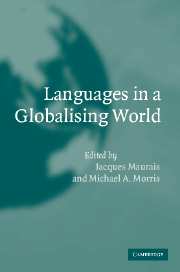Book contents
- Frontmatter
- Contents
- List of figures
- List of tables
- Notes on contributors
- Acknowledgements
- 1 Introduction
- Part I Global communication challenges
- Part II Major areas
- Part III Languages of wider communication
- 15 The international standing of the German language
- 16 Arabic and the new technologies
- 17 Russian in the modern world
- 18 Geolinguistics, geopolitics, geostrategy: The case of French
- 19 Towards a scientific geostrategy for English
- 20 On Brazilian Portuguese in Latin American integration
- Conclusion
- Index
18 - Geolinguistics, geopolitics, geostrategy: The case of French
Published online by Cambridge University Press: 18 November 2009
- Frontmatter
- Contents
- List of figures
- List of tables
- Notes on contributors
- Acknowledgements
- 1 Introduction
- Part I Global communication challenges
- Part II Major areas
- Part III Languages of wider communication
- 15 The international standing of the German language
- 16 Arabic and the new technologies
- 17 Russian in the modern world
- 18 Geolinguistics, geopolitics, geostrategy: The case of French
- 19 Towards a scientific geostrategy for English
- 20 On Brazilian Portuguese in Latin American integration
- Conclusion
- Index
Summary
For over a decade, I have been the Cassandra of the Francophonie (Frenchspeaking world) in the sense that I have tried in vain to alert those responsible for French language policy about the risks facing the future of French in the world. The occasional contributions that I have sent to French daily newspapers that deal with these questions have hardly ever been published. This has not bothered me too much since I have been able to place them in the journal Languages and Development (Langues et développement) or elsewhere. This personal observation seems significant, since the French press is unanimous and vocal in espousing what might be called Francophonie rhetoric, that is, that the position of French in the world is strong and likely to improve still more. The discourse in Le Monde when the journalist Mr Peroncelle-Hugoz was in charge was the same as that in Le Figaro with the exception that articles in the latter French daily were generally more substantive and better informed. For the benefit of readers unfamiliar with French political life, nationalism is a value shared by both the Communist Party and the French far right, a fact at once strange if explicable.
Emphasis on the dangers that French faces in the world need not produce anguish inasmuch as languages live and die like everything in this transient world, whatever claims of incivility or alienation are made against this view. A study published by the British Council (Graddol 1997) on the future of English expresses views close to mine about the future of French.
- Type
- Chapter
- Information
- Languages in a Globalising World , pp. 291 - 297Publisher: Cambridge University PressPrint publication year: 2003
- 9
- Cited by

